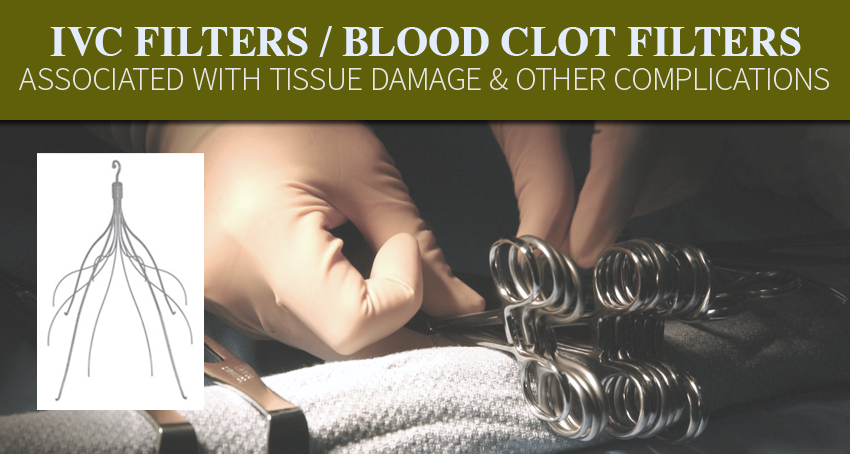Monroe Law Group – NO FEES UNLESS YOU WIN You pay nothing until you win your case. Monroe Law Group pays for all costs of the lawsuit up front, and if don’t win, you pay nothing! If we win, you pay a percentage of the awarded settlement. Call us now at 866-308-1092 or email us at intake@monroelawgroup.com for your free no obligation case evaluation.
Patients implanted with an IVC filter to reduce their risk of blood clots and pulmonary embolism may be at risk for complications that are equally as dangerous, including vena cava perforation, filter fracture and embolization, and migration of the filter to other parts of the body.
If you received an IVC filter in the past, and you have since suffered a potentially life-threatening side effect as a result, you may be entitled to financial compensation for your injuries and medical expenses. Contact a knowledgeable IVC filter lawyer today to discuss your options for legal recourse.

An inferior vena cava (IVC) filter is a type of vascular filter surgically implanted in the inferior vena cava, the largest vein in the body, responsible for moving deoxygenated blood from the lower legs to the heart and lungs. The cage-like construction of the IVC filter is specifically designed to trap blood clots that break free from the lower extremities, and prevent them from traveling to the lungs and causing a pulmonary embolism or other serious complications. IVC filters were first introduced in the United States in 1979, and use of the devices has increased dramatically over the years. By 2012, doctors had inserted approximately 259,000 IVC filters in patients at risk for blood clots and pulmonary embolism. Some of the most widely-used IVC filter models include:
Anticoagulant medications are typically prescribed to patients at risk for blood clots, but doctors often use IVC filters in patients who are unable to take blood thinners, or for whom anticoagulant therapy is unsuccessful or inappropriate. However, IVC filters have been linked recently to a host of serious side effects, including:
Retrievable IVC filters provide short-term protection from blood clots, and are designed to be removed once the risk of pulmonary embolism (PE) has passed. However, the FDA has voiced concerns about the fact that “retrievable IVC filters, intended for short-term placement, are not always removed once a patient’s risk for PE subsides.” In 2010, the U.S. Food and Drug Administration (FDA) issued a warning about the alleged risk of IVC filter side effects, highlighting 921 adverse event reports submitted to the agency in connection with the medical devices during the previous five years, including 328 reports of device migration, 146 reports of filter embolization, 70 reports of vena cava perforation, and 56 reports of filter fracture.
In 2014, the FDA updated its IVC filter safety announcement, indicating that the agency had “received reports of adverse events and product problems associated with IVC filters,” including “device migration, filter fracture, embolization (movement of the entire filter or filter fragments to the heart or lungs), perforation of the IVC, and difficulty removing the device.” According to the FDA, retrievable IVC filters should be removed between one to two months after implantation, as long as the risk of pulmonary embolism has subsided, in order to reduce the risk of serious complications.
C.R. Bard is one of the largest manufacturers of IVC filters, and there is evidence that the company may have known about problems with its Recovery filter as early as 2004, yet withheld information about this risk from the public and the FDA. According to reports, Bard hired an independent consultant in 2004 to compare filter fracture and migration rates associated with its new filters to those of older models, and discovered that the Recovery filter was linked to a significantly higher rate of complications than its competitors. Rather than remove the Recovery filter from the market, Bard continued to sell the potentially dangerous device until 2005, when the company replaced the Recovery filter with the nearly identical G2 series of blood clot filters.
IVC filter lawsuits brought against C.R. Bard and other makers of potentially dangerous blood clot filters allege that the manufacturing companies knew or should have known about the risk of IVC filter side effects, yet failed to provide adequate warnings about this risk to consumers and the medical community. Firms nationwide including Monroe Law Group are accepting IVC Filter cases. If you believe you have been harmed by side effects of a blood clot filter like the Bard Recovery or Bard G2 filter, consult the Monroe Law Group today for legal help. With a qualified IVC filter attorney on your side, you can ensure that your legal rights are protected and seek fair and timely reimbursement for your losses.
Alert: Due to statute of limitations, the time you have to pursue an IVC filter claim is limited. Call us right away at 866-308-1092, email us at intake@monroelawgroup.com, or complete the form on this page now.